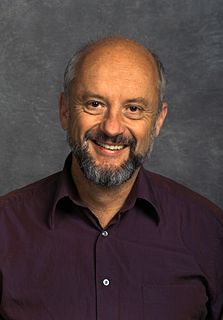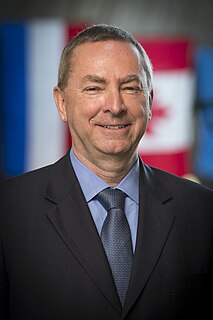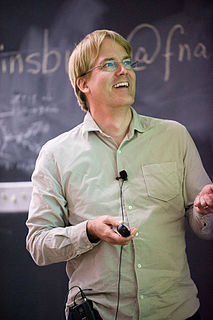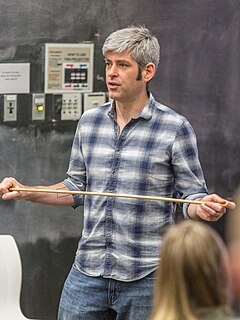Related Research Articles

Leon Max Lederman was an American experimental physicist who received the Nobel Prize in Physics in 1988, along with Melvin Schwartz and Jack Steinberger, for research on neutrinos. He also received the Wolf Prize in Physics in 1982, along with Martin Lewis Perl, for research on quarks and leptons. Lederman was director emeritus of Fermi National Accelerator Laboratory (Fermilab) in Batavia, Illinois. He founded the Illinois Mathematics and Science Academy, in Aurora, Illinois in 1986, where he was Resident Scholar Emeritus from 2012 until his death in 2018.

Fermi National Accelerator Laboratory (Fermilab), located just outside Batavia, Illinois, near Chicago, is a United States Department of Energy national laboratory specializing in high-energy particle physics. Since 2007, Fermilab has been operated by the Fermi Research Alliance, a joint venture of the University of Chicago, and the Universities Research Association (URA). Fermilab is a part of the Illinois Technology and Research Corridor.

The Tevatron was a circular particle accelerator in the United States, at the Fermi National Accelerator Laboratory, east of Batavia, Illinois, and is the second highest energy particle collider ever built, after the Large Hadron Collider (LHC) of the European Organization for Nuclear Research (CERN) near Geneva, Switzerland. The Tevatron was a synchrotron that accelerated protons and antiprotons in a 6.28 km (3.90 mi) ring to energies of up to 1 TeV, hence its name. The Tevatron was completed in 1983 at a cost of $120 million and significant upgrade investments were made during its active years of 1983–2011.

Robert Rathbun Wilson was an American physicist known for his work on the Manhattan Project during World War II, as a sculptor, and as an architect of the Fermi National Accelerator Laboratory (Fermilab), where he was the first director from 1967 to 1978.

The Institute for Nuclear Studies was founded September 1945 as part of the University of Chicago with Samuel King Allison as director. On November 20, 1955, it was renamed The Enrico Fermi Institute for Nuclear Studies. The name was shortened to The Enrico Fermi Institute (EFI) in January 1968.

David Norman Schramm was an American astrophysicist and educator, and one of the world's foremost experts on the Big Bang theory. Schramm was a pioneer in establishing particle astrophysics as a vibrant research field. He was particularly well known for the study of Big Bang nucleosynthesis and its use as a probe of dark matter and of neutrinos. He also made important contributions to the study of cosmic rays, supernova explosions, heavy-element nucleosynthesis, and nuclear astrophysics generally.

Piermaria Jorge Oddone is a Peruvian-American particle physicist.
The Panofsky Prize in Experimental Particle Physics is an annual prize of the American Physical Society. It is given to recognize and encourage outstanding achievements in experimental particle physics, and is open to scientists of any nation. It was established in 1985 by friends of Wolfgang K. H. Panofsky and by the Division of Particles and Fields of the American Physical Society. Panofsky was a physics professor at Stanford University and the first director of the Stanford Linear Accelerator Center (SLAC). Several of the prize winners have subsequently won the Nobel Prize in Physics. As of 2021, the prize included a $10,000 award.

The Collider Detector at Fermilab (CDF) experimental collaboration studies high energy particle collisions from the Tevatron, the world's former highest-energy particle accelerator. The goal is to discover the identity and properties of the particles that make up the universe and to understand the forces and interactions between those particles.

The DØ experiment was a worldwide collaboration of scientists conducting research on the fundamental nature of matter. DØ was one of two major experiments located at the Tevatron Collider at Fermilab in Batavia, Illinois. The Tevatron was the world's highest-energy accelerator from 1983 until 2009, when its energy was surpassed by the Large Hadron Collider. The DØ experiment stopped taking data in 2011, when the Tevatron shut down, but data analysis is still ongoing. The DØ detector is preserved in Fermilab's DØ Assembly Building as part of a historical exhibit for public tours.
The Xi baryons or cascade particles are a family of subatomic hadron particles which have the symbol Ξ and may have an electric charge of +2 e, +1 e, 0, or −1 e, where e is the elementary charge.

Nigel Stuart Lockyer is a British-American experimental particle physicist. He was the Director of the Fermi National Accelerator Laboratory (Fermilab), in Batavia, Illinois, the leading particle physics laboratory in the United States, from September 2013 to April 2022.

Joseph David Lykken is a theoretical physicist at the Fermi National Accelerator Laboratory. Since July 1, 2014 he has been the Deputy Director for Research of Fermilab. He is currently leading the Fermilab Quantum Institute.
Craig Hogan is a Professor of Astronomy and Physics at the University of Chicago and he is the director of the Fermilab Center for Particle Astrophysics.
INSPIRE-HEP is an open access digital library for the field of high energy physics (HEP). It is the successor of the Stanford Physics Information Retrieval System (SPIRES) database, the main literature database for high energy physics since the 1970s.

Daniel Wayne Hooper is an American cosmologist and particle physicist specializing in the areas of dark matter, cosmic rays, and neutrino astrophysics. He is a Senior Scientist at Fermi National Accelerator Laboratory and an Associate Professor of Astronomy and Astrophysics at the University of Chicago.

Anna Grassellino is an Italian and American physicist, Senior Scientist and, since 2020, Director of the SQMS Center at Fermilab. In 2017 she was awarded the Presidential Early Career Award for Scientists and Engineers by Barack Obama.
Joshua A. Frieman is a theoretical astrophysicist who lives and works in the United States. He is a senior scientist at Fermilab and a professor of astronomy and astrophysics at the University of Chicago. Frieman is known for his work studying dark energy and cosmology, and he co-founded the Dark Energy Survey experiment. He was elected a member of the National Academy of Sciences in 2022.
Scott Dodelson is an American physicist. He is a professor of physics at Carnegie Mellon University and chair of its physics department.
Elizabeth Jane Buckley-Geer is a particle physicist and astrophysicist at Fermilab, where she studies gravitational lensing as a collaborator on the Dark Energy Survey and Dark Energy Spectroscopic Instrument. She is also an associate of the University of Chicago Consortium for Advanced Science and Engineering.
References
- ↑ "Fermilab Center for Particle Astrophysics". Archived from the original on 2015-09-23. Retrieved 2015-10-07.